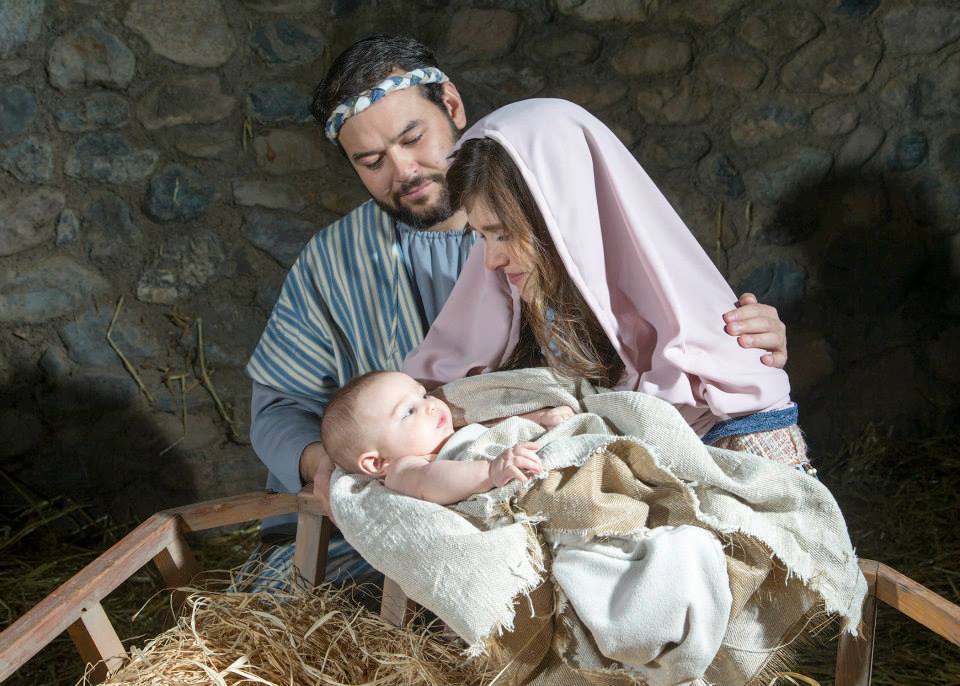OREM — Tradition abounds in the SCERA’s latest incarnation of Liken‘s The First Christmas. This is the production’s third year, and the show offers a lovely introduction into the forthcoming holidays.

The story focuses on a familiar seasonal gathering. The Millers have traveled to spend time with their grandparents, though catastrophe strikes when the kids realize that Grandpa doesn’t have working wireless. Without the distraction of cell phones and wireless, children Tess and Connor Miller find themselves in dire trouble of being very bored. But Grandpa reminds them that sometimes, it is alright to “disconnect to reconnect.” Complaints turn into curiosity, however, as Grandpa pulls out the family’s Bible and retells the religious account of the first Christmas, the birth of Jesus Christ. Rather than remain passive listeners, each family member plays an integral role in the story-telling, assuming their place in the roster of characters involved, and by the end, the act of coming together to revere a sacred occasion transcends the need for technological distraction.
While highly didactic in nature, there’s a fun campiness to the production that’s quite comforting and delightful this time of the year. The format of the play did not necessarily lend to a more grounded nature, and rather, fell into the “larger-than-life” quality prevalent in the Liken film canon. Joy and exuberance filled this production with high energy, and the blatant narrative made it an easy piece for younger audiences to enjoy. There’s a certain respect that naturally accompanies reading aloud the Christmas story, and I appreciated the ability of Dennis Agle‘s script to maintain a basic reverence for the spiritual while striving providing a sense of the comedic and spectacle. If Agle still plans to develop his script, I suggest keeping the story more tethered to the emotions of the season by finding the real heart and soul of Christ’s birth, and allowing moments where the Christmas spirit isn’t pushed to exuberant exaggeration. This worked to great effect with the Shepherds, who were a lively, excitable bunch that found a soulful resonance in their rendition of “He’s Born.” I believe the simplicity and beauty of that piece made it my favorite of the night.

There were moments when the gimmicks seemed to outshine the need. That is, some gags played ad nauseam, rather than propelling the story. For example, the ribbon dancing in Herod’s Palace was funny the first time, but when repeated with a second and third performance, it only let the show’s energy drop. Having family members double as characters in the Nativity worked for the most part, though establishing a convention for how they entered the scenes might have made this smoother. At times, they simply donned a costume piece or two and crossed the stage to play their new role. At others, there were seemingly more elaborate changes and running around backstage that lent to prolonged transitions between scenes, and consequentially slowed down the show. I would have been fine with the continued transition of simply crossing over to the other side of the stage. That being said, general use of space worked to great effect. A multi-level set (with a beautiful design by Jan Shelton Hunsaker) called to mind the biblical Middle East, while still being generic enough to meld easily into every scene portrayed. Blocking was smart and the use of space with large chorus numbers really helped to show off every member of the cast.

Of particular merit was McKelle Shaw, as Sharif. She seemed to be having fun with her part, and her joy as a shepherd felt absolutely real. She was heartfelt in every moment she was on stage, and the switch to something much more tender in ” He’s Born ” left me with those delightful, warm Christmas fuzzies. She stood out among the cast as exemplary, and I truly appreciated her performance. As Mary, Caroline Chauncey demonstrated a real sense of grace and subtle beauty perfectly suited to the character. As Melissa Miller however, Chauncey lacked a believable chemistry with Jason Case as her stage husband, Jared Miller. Case found a believable and playful cadence in role of the father, and his voice brought a very warm resonance to Joseph. Finally, Daniel Beck in the role of Gabriel brought sonorous depth to his every scene. His Gabriel was charismatic and filled with real joy upon announcing the birth of Christ.
This same joy filled the theater upon conclusion of the performance. The importance of such a simplistic, yet inherently beautiful moment resonated as actors formed a crèche, leaving the audience with visions of the first Christmas. Perhaps greater attention could have been paid to the family’s decision to forego their technological devices, offering them to the baby Jesus. This detail aside, I was very pleased with the due reverence and exultation that marked The First Christmas‘s finale.
Any family seeking for a good introduction to the holiday season may certainly benefit from this piece, especially theater goers of religious persuasion and particularly those with younger children. And perhaps, as the theme might suggest, it can be nice to disconnect from technology for a bit and reconnect to the Bible’s Christmas story.
[box type=”shadow”]Liken’s The First Christmas plays every Thursday, Friday, Saturday, and Monday at 7:30 PM through December 13 at the SCERA Center for the Arts (745 S. State Street, Orem). Tickets are $10-12. For more information, visit www.scera.org.[/box]
